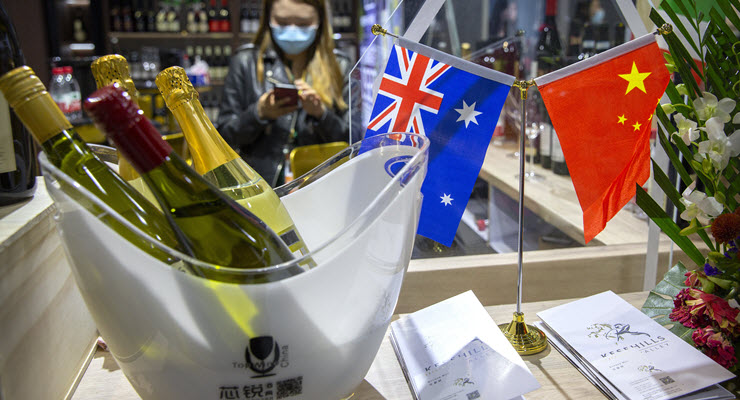
Australian producers are bearing the disproportionate brunt of trade punishment from China compared with its strategic partners, and economists warn that the impact on export industries is an increasingly overlooked cost of our hostile relationship with Beijing.
Research conducted by James Laurenceson and Thomas Pantle from the Australia China Relations Institute at the University of Technology Sydney found Beijing’s retaliatory trade sanctions have hammered exporters in markets like wine and barley, and producers in the United States have taken advantage of the export gap.
Chinese imports of “disrupted goods” — including beef, barley, wine and rock lobster — were down US$12.6 billion between January and September, compared with the same period in 2019.
“US producers are snapping up our markets in China at a rate that outstrips any other country,” Laurenceson said. “I’m not trying to suggest these countries are doing anything devious; they’re doing precisely what we expect them to do. The costs being experienced at the moment aren’t being shared.”
Those costs are a consequence of Australia’s toxic relationship with China. Tensions have simmered over the past four years, as President Xi Jinping’s brand of muscular nationalism led Beijing to take a more aggressive footing on the world stage. In turn, the attitude out of Canberra has been increasingly hawkish, and at times — particularly under the Morrison government — clumsy.
Beijing has expressed fury about decisions such as former prime minister Malcolm Turnbull banning Chinese telco Huawei from Australia’s 5G network. But the Morrison government’s unilateral calls for an independent inquiry into China’s handling of the COVID-19 pandemic led Beijing to impose harsh trade restrictions on coal, barley, wine, lobster and timber.
Nearly two years on, the impacts haven’t been nearly as dire as once feared. Iron ore prices have acted as a counterweight for disruption felt by other industries. Australian exporters have been able to find markets for coal and barley elsewhere. But Australia’s wine industry has felt the loss badly. Wine imports to China fell 92% between 2019 and 2021.
“Our wine exports have collapsed,” Laurenceson said. “Even if the macroeconomic costs are not so large, let’s be clear that whatever costs there are aren’t being shared.”
The report warns that although Australia has withstood the impact of trade sanctions in the short term, China still has significant scope to escalate trade punishments.
Whether or not it would do that remains unclear. But what is clear is that the relationship with Beijing shows little sign of improvement. The Morrison government signing the AUKUS pact antagonised China — acting ambassador Wang Xining referred to Australia as a “sabre wielder” and a “naughty guy”.
Defence Minister Peter Dutton talks openly about the possibility of conflict. At the National Press Club last Friday he warned about “dark clouds” gathering over the region, and compared our current era to the 1930s.
Lauenceson says it’s rhetoric like that which locks in a continuation of economic punishment from China. And while he stresses Beijing is at fault for economic struggles felt by some industries, the report shows Australia’s strategic allies, including the US, New Zealand and Canada have all continued to deepen economic ties, in some instances, selling more to China than ever before, despite also engaging in pointed rhetoric about the Chinese Communist Party.
Those countries have avoided the extent of the trade sanctions and diplomatic barbs Australia has copped, Laurenceson says, because they’ve done so with a tactfulness the Morrison government lacks.
“Plenty of countries have banned Huawei, or spoken up about Xinjiang but without the hairy-chested rhetoric,” he said. “Again, maybe the costs [of economic decoupling] are worth bearing, but let’s be realistic that we’re bearing them alone.”








Crikey is committed to hosting lively discussions. Help us keep the conversation useful, interesting and welcoming. We aim to publish comments quickly in the interest of promoting robust conversation, but we’re a small team and we deploy filters to protect against legal risk. Occasionally your comment may be held up while we review, but we’re working as fast as we can to keep the conversation rolling.
The Crikey comment section is members-only content. Please subscribe to leave a comment.
The Crikey comment section is members-only content. Please login to leave a comment.